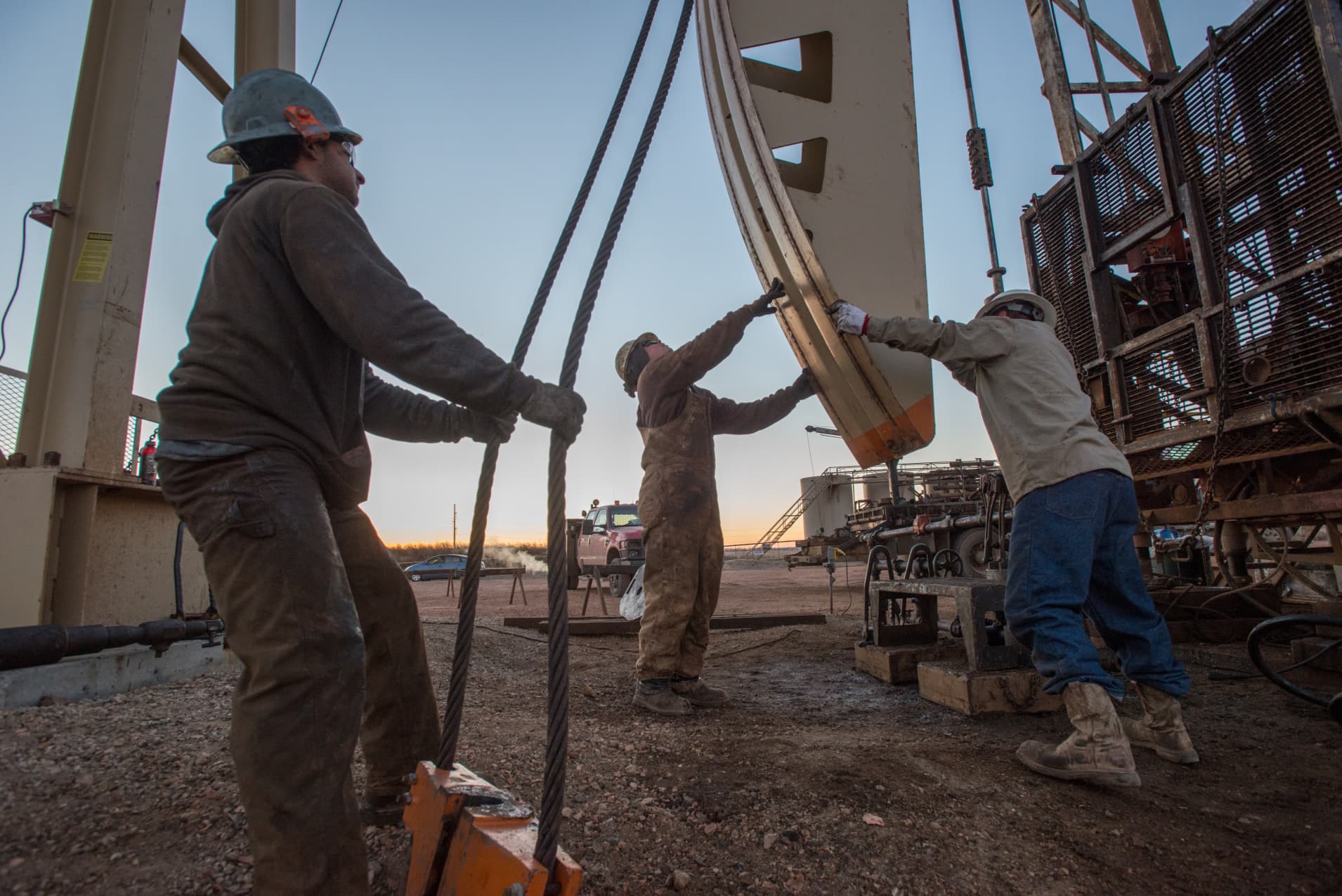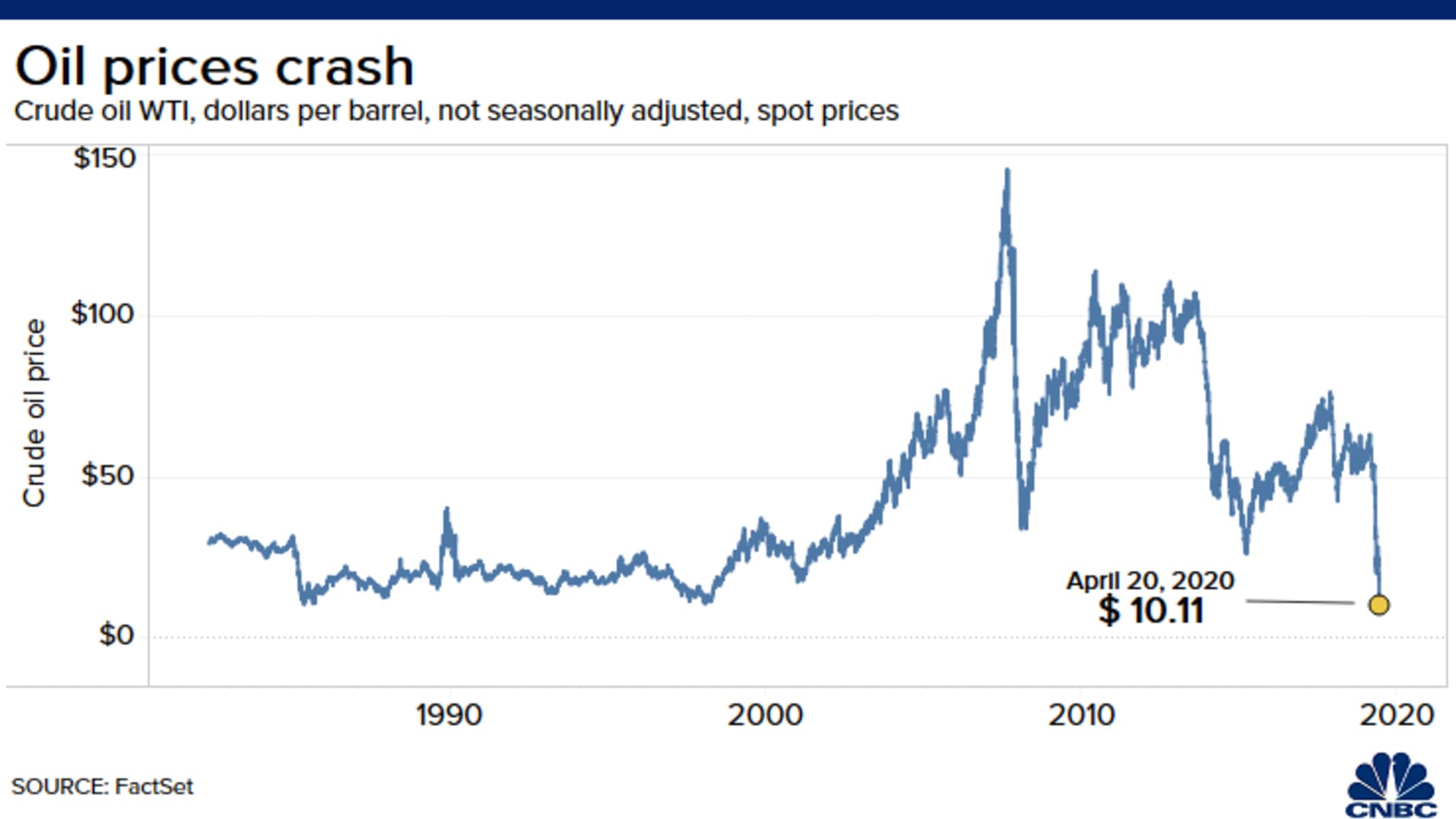
- The May contract of U.S. West Texas Intermediate (WTI) futures fell to $11.66 a barrel on Monday, down more than 36%. It means the price grade is on track to register its worst day back to contract inception in 1983.
- To be sure, the May contract expires on Tuesday, thus leaving it exposed to weaker trading volumes and more extreme market moves.
- The June contract of WTI, which is more actively traded, stood at $22.29 a barrel, almost 11% lower.
- “The curves are saying we have a big problem with the storage of oil right now,” Bjarne Schieldrop, chief commodities analyst at SEB, told CNBC via email.
U.S. oil prices were on track for their worst day on record on
Monday, with crude storage facilities filling rapidly as the coronavirus
pandemic continues to crush demand.
The May contract of U.S. West Texas Intermediate (WTI)
futures fell to $11.54 a barrel on Monday, down more than 36%. It means
the price grade is on pace to register its worst day back to contract
inception in 1983.
To
be sure, the May contract expires on Tuesday, thus leaving it exposed
to weaker trading volumes and more extreme market moves. The June
contract of WTI, which is more actively traded, stood at $22.29 a
barrel, almost 11% lower.
Meanwhile, international benchmark Brent crude stood at $26.41 on Monday, around 6% lower for the session.
It
comes amid heightened concern that the volume of oil held in U.S.
storage is rising sharply, with the coronavirus crisis compounding the
problem by dramatically reducing consumption.
“The current forward
crude oil curves for Brent and WTI are now in very deep contango, but
the contango is also very front-loaded,” Bjarne Schieldrop, chief
commodities analyst at SEB, told CNBC via email.
A contango market
implies oil traders believe crude prices will rally in the future,
encouraging them to store oil now and to sell at a later date.

“The curves are saying we have a big problem with
the storage of oil right now,” Schieldrop said, noting the general
market view seemed to be that the global economic trough and the oil
demand trough would be April 2020.
In the second half the year, he continued, the problem of storage capacity should “vanish rapidly” because oil demand is expected to rebound strongly, while inventories will draw down sharply. “This is why the Brent crude average oil price for 2021 is holding up so well at $40 a barrel,” Schieldrop added.
In the second half the year, he continued, the problem of storage capacity should “vanish rapidly” because oil demand is expected to rebound strongly, while inventories will draw down sharply. “This is why the Brent crude average oil price for 2021 is holding up so well at $40 a barrel,” Schieldrop added.
‘Without any sort of hope’
Earlier this month, analysts at Goldman Sachs warned
that the coronavirus shock was “extremely negative for oil prices and
is sending landlocked crude prices into negative territory.”
The U.S. investment bank said it expected waterborne crudes like Brent to be far more insulated from the coronavirus shock, with prices likely to remain near cash costs of $20 a barrel — albeit with temporary spikes below.
Brent is priced on an island in the North Sea roughly 500 meters from the water, where tanker storage is accessible. In contrast, WTI is landlocked and 500 miles from water.
“This illustrates an important point,” analysts at Goldman Sachs said in a research note. They argued waterborne crudes were likely to be “better positioned” than landlocked price grades — like crude oils in the U.S., Canada and Russia — because they had comparatively easy access to tanker storage.
The U.S. investment bank said it expected waterborne crudes like Brent to be far more insulated from the coronavirus shock, with prices likely to remain near cash costs of $20 a barrel — albeit with temporary spikes below.
Brent is priced on an island in the North Sea roughly 500 meters from the water, where tanker storage is accessible. In contrast, WTI is landlocked and 500 miles from water.
“This illustrates an important point,” analysts at Goldman Sachs said in a research note. They argued waterborne crudes were likely to be “better positioned” than landlocked price grades — like crude oils in the U.S., Canada and Russia — because they had comparatively easy access to tanker storage.

“The U.S. situation is quite dire,” Daniel Hynes, senior commodity strategist at ANZ, told CNBC’s “Squawk Box” on Monday.
“Clearly, being a relatively landlocked market there, we are seeing real pressure on storage as a consequence of the collapse in demand,” Hynes continued. “Without any sort of hope I suppose, at least over the next month about that easing up. I think prices are going to remain under pressure.”
The Covid-19 outbreak has meant countries have effectively had to shut down, with many governments imposing restrictive measures on the daily lives of billions of people. It has created an unprecedented demand shock in energy markets, with storage space – both onshore and offshore – quickly filling up.
To date, more than 2.4 million people have contracted the coronavirus worldwide, with 165,257 deaths, according to data compiled by Johns Hopkins University.
“Going forward, of course, we are going to have to see a lot of declines in production in the U.S. in order to push this thing a little bit higher,” Samir Madani, founder of TankerTrackers.com, told CNBC’s “Capital Connection” on Monday.
“U.S. energy is very important for global energy security … because if it wasn’t for U.S. energy then prices would be a whole lot higher,” Madani said.
— CNBC’s Abigail Ng contributed to this report.
“Clearly, being a relatively landlocked market there, we are seeing real pressure on storage as a consequence of the collapse in demand,” Hynes continued. “Without any sort of hope I suppose, at least over the next month about that easing up. I think prices are going to remain under pressure.”
The Covid-19 outbreak has meant countries have effectively had to shut down, with many governments imposing restrictive measures on the daily lives of billions of people. It has created an unprecedented demand shock in energy markets, with storage space – both onshore and offshore – quickly filling up.
To date, more than 2.4 million people have contracted the coronavirus worldwide, with 165,257 deaths, according to data compiled by Johns Hopkins University.
“Going forward, of course, we are going to have to see a lot of declines in production in the U.S. in order to push this thing a little bit higher,” Samir Madani, founder of TankerTrackers.com, told CNBC’s “Capital Connection” on Monday.
“U.S. energy is very important for global energy security … because if it wasn’t for U.S. energy then prices would be a whole lot higher,” Madani said.
— CNBC’s Abigail Ng contributed to this report.
No comments:
Post a Comment